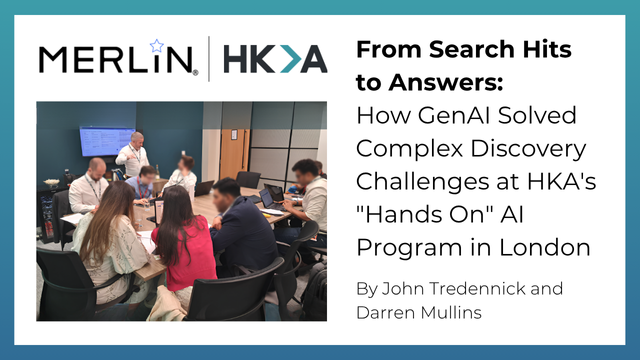
[EDRM Editor’s Note: The opinions and positions are those of John Tredennick and Darren Mullins.]
Picture this: Six teams of senior legal professionals from the world’s largest law firms and investigation groups, each armed with nothing but a natural language question and access to 14,000 documents from one of Britain’s most complex scandals. Their challenge? Master an AI-powered investigation platform they’d never seen before and produce sophisticated multi-page reports analyzing the UK Post Office disaster. Their time limit? Just 45 minutes. The result? A groundbreaking demonstration that complex investigations and discovery will never be the same.
On July 2nd, 2025, HKA London’s headquarters hosted the first Hands On AI program of its kind for litigation and investigation professionals. Partnering with Merlin Search Technologies, investigations partner Darren Mullens designed an unprecedented experiment: Could seasoned practitioners transform weeks of traditional document review into minutes of AI-powered analysis without sacrificing professional quality? The excitement was palpable as teams scattered throughout HKA’s conference facilities, diving into their assigned topics with an enthusiasm that extended the planned 30-minute research session to 45 minutes. What emerged was not just proof that AI can revolutionize legal practice, but evidence that the profession is ready to embrace this transformation.
Could seasoned practitioners transform weeks of traditional document review into minutes of AI-powered analysis without sacrificing professional quality?… What emerged was not just proof that AI can revolutionize legal practice, but evidence that the profession is ready to embrace this transformation.
John Tredennick, Merlin Search Technologies, and Darren Mullins, HKA Global.
The Ultimate Test Case: UK Post Office Scandal
When you want to test whether AI can handle the most challenging aspects of document-intensive investigations, you don’t choose easy material. The UK Post Office scandal—one of the largest miscarriages of justice in British history—provided the perfect proving ground for this unprecedented demonstration. This wasn’t a sanitized training exercise with simplified documents. This was the real deal: over 14,000 government documents from official investigations into a disaster that destroyed lives, bankrupted innocent people, and exposed systemic institutional failures across multiple organizations.
The scandal’s complexity made it an ideal stress test for AI-powered investigation tools. Between 1999 and 2015, over 900 subpostmasters were wrongly prosecuted for theft, fraud, and false accounting due to catastrophic errors in the Horizon accounting software system developed by Fujitsu. The faulty system reported false financial shortfalls that led to criminal convictions, prison sentences for 236 people, and widespread financial ruin for innocent families. But the technology failure was just the beginning—what followed was a decade-long cover-up involving aggressive prosecutions, institutional denial, and the systematic dismissal of legitimate concerns raised by the victims themselves.
The Investigation Topics
We created six different topics, one for each team. You can see from these examples that they were not simple questions. Rather we set out to create real-world questions that would not be easy to answer. Judge for yourself:
1. Technical System Analysis
Analyze all technical evidence regarding Horizon IT system defects, including error logs, known issues lists, and expert testimony about specific software bugs that caused financial discrepancies in subpostmaster accounts.
2. Knowledge vs. Actions Analysis
Analyze all evidence related to the Post Office’s knowledge of potential Horizon system defects while simultaneously pursuing criminal prosecutions, including internal communications acknowledging system issues and subsequent public denials.
3. Specific Information Retrieval
Find specific testimony from Post Office or Fujitsu employees given to the Public Inquiry regarding the capability for remote access to sub-postmaster branch accounts via the Horizon system, and whether this capability was disclosed to sub-postmasters. Extract key quotes and cite sources.
4. Temporal Pattern Analysis
Analyze how the Post Office’s official stance on the reliability of the Horizon system evolved over time from initial denials to later acknowledgments as presented in public statements, legal submissions, and inquiry evidence. Identify key turning points.
5. Human Impact Assessment
Compile and analyze all victim impact statements and testimony from convicted subpostmasters regarding the personal, financial, and psychological consequences of wrongful prosecution, including evidence about suicide attempts, bankruptcy, and community ostracism.
6. Comprehensive Timeline Creation
Generate a detailed chronological timeline of the UK Post Office Scandal, from the introduction of the Horizon system to the latest developments in the Public Inquiry and compensation schemes. Cite key documents or events for each entry.
Each of these topics represents the kind of sophisticated, multi-dimensional analysis that defines high-level investigative work. They require synthesizing information across different document types, identifying patterns that emerge over time, understanding technical complexities, and connecting institutional behavior to human consequences. These aren’t questions you can answer by searching for a few keywords—they demand the kind of comprehensive analysis that has traditionally required teams of senior professionals working for weeks.
More importantly, these topics mirror the real-world challenges that legal professionals face daily: uncovering institutional knowledge while organizations deny problems, tracking the evolution of corporate positions through internal communications, analyzing technical failures alongside their human impact, and constructing comprehensive timelines from fragmentary evidence scattered across thousands of documents.
More importantly, these topics mirror the real-world challenges that legal professionals face daily: uncovering institutional knowledge while organizations deny problems, tracking the evolution of corporate positions through internal communications, analyzing technical failures alongside their human impact, and constructing comprehensive timelines from fragmentary evidence scattered across thousands of documents.
John Tredennick, Merlin Search Technologies, and Darren Mullins, HKA Global.
This was exactly the kind of investigative challenge we needed to test whether AI-powered tools could truly transform professional practice. If teams could master these complex topics in 45 minutes using natural language questions, it would prove that the fundamental assumptions underlying traditional discovery methods might be ready for revolutionary change.
Aren’t Keywords Good Enough?
For traditional keyword-based discovery, this case presents a nightmare scenario. How do you construct search terms to uncover patterns of institutional obstinacy? What Boolean queries reveal the evolution of corporate denial strategies? How do you identify the critical turning points in a scandal that unfolded over more than a decade through thousands of internal communications, technical reports, witness statements, and legal proceedings? The interconnected web of technical failures, corporate decision-making, legal strategy, and human impact creates exactly the kind of complex, multi-dimensional investigation challenge that has traditionally required teams of senior professionals working for weeks to untangle.
This was the crucible where traditional discovery methods would meet AI-powered investigation tools. The question wasn’t whether the technology could work in theory—it was whether it could deliver transformative results when confronted with the messy, complex, interconnected reality of actual investigative work.
The Elite Participants: No Novices Here
This wasn’t a gathering of technology enthusiasts eager to try the latest gadget. HKA had carefully selected six of their most important clients to participate, each sending teams of three senior ediscovery professionals from some of the world’s largest law firms and investigation groups. These were battle-tested practitioners whose daily work involves the most complex, high-stakes document-intensive matters. They evaluate new approaches through the unforgiving lens of practical necessity, client demands, and professional standards that leave no room for error.
Thirty Minutes to Master the Impossible
Here’s where the experiment became truly audacious. These experienced professionals had built their careers on mastering complex document review processes that often take weeks to complete properly. Now they had exactly 30 minutes to learn an entirely new approach to investigation and discovery. No lengthy training manuals. No multi-day workshops. No gradual introduction to features and capabilities.
Here’s where the experiment became truly audacious. These experienced professionals had built their careers on mastering complex document review processes that often take weeks to complete properly. Now they had exactly 30 minutes to learn an entirely new approach to investigation and discovery.
John Tredennick, Merlin Search Technologies, and Darren Mullins, HKA Global.
Instead, they received a focused introduction to Merlin Alchemy’s FAR framework—Find, Analyze, Report—and its integrated suite of AI and generative AI algorithms. The concept was revolutionary: rather than constructing keyword searches and reviewing thousands of search hits, teams would simply pose natural language questions and receive comprehensive analytical answers. The platform would handle the finding through sophisticated document analysis, the analyzing through multiple AI models working in concert, and the reporting through structured, citation-rich summaries that would normally require senior attorneys weeks to produce.
The transformation was conceptual as much as technological. Instead of thinking like search engineers constructing Boolean queries, they would think like investigators asking the right questions. Instead of reviewing documents to find relevant information, they would receive answers supported by direct links to source materials. The promise was that professional expertise would be amplified rather than replaced—human intelligence asking sophisticated questions, artificial intelligence delivering comprehensive answers.
The Competition Begins: 45 Minutes to Excellence
What happened next surprised even the organizers. The planned 30-minute research phase extended to 45 minutes—not because teams were struggling with the technology, but because they were so engaged with their analysis that they didn’t want to stop. The conference room at HKA’s London headquarters buzzed with an energy rarely seen in technology demonstrations. Teams dispersed throughout the facilities: some claiming tables in the main U-shaped conference room, others retreating to smaller breakout rooms for focused collaboration.
This wasn’t the polite attention of professionals enduring another software demo. This was genuine excitement from practitioners who recognized they were experiencing something transformative. The competitive atmosphere intensified as teams realized they were producing sophisticated, multi-page reports in real-time—the kind of comprehensive analysis that would typically require their firms to assign multiple attorneys for extended periods.
The Research Challenge: Complex Questions, No Easy Answers
Each team received a different complex investigation question drawn from the extensive list of sample topics designed specifically for the UK Post Office scandal. These weren’t simple factual queries that could be answered with basic keyword searches. Instead, they were the kind of sophisticated analytical challenges that define high-level investigative work: understanding institutional decision-making patterns, tracking the evolution of corporate positions over time, analyzing technical failures and their human consequences, and identifying critical turning points in complex organizational scandals.
The questions demanded exactly the kind of multi-dimensional analysis that traditional discovery methods struggle to provide efficiently. Teams needed to synthesize information across multiple document types, identify patterns that emerged over extended time periods, and construct comprehensive narratives from fragmentary evidence scattered throughout thousands of pages of materials. These were precisely the challenges that had historically required teams of senior professionals working for weeks to address properly.
But here’s what made the experiment truly remarkable: teams approached their analysis with no prior knowledge of their assigned topics. They weren’t experts in postal service operations, software system failures, or British institutional governance. They were starting from zero, armed only with sophisticated questions and access to Alchemy’s integrated AI capabilities. The platform would need to bridge the gap between professional expertise in investigative methodology and substantive knowledge of complex subject matter—exactly the kind of challenge that real-world discovery work presents daily.
The Breakthrough Moment: When Questions Became Answers
What happened over those 45 minutes defied every expectation about document-intensive investigation work. Teams that had started with nothing more than complex questions and unfamiliar technology were producing sophisticated, multi-page analyses that would normally require weeks of traditional document review. The transformation wasn’t just about speed—it was about the fundamental nature of how professional investigation work could be accomplished.
Each team approached their analysis differently, but all experienced the same revolutionary shift from search-based to question-based investigation. Instead of constructing keyword searches and reviewing hundreds or thousands of potentially relevant documents, they simply asked Alchemy sophisticated questions and received comprehensive, analytically rich answers. The platform’s integrated AI algorithms handled the complex work of finding relevant information across 14,000 documents, analyzing patterns and relationships, and synthesizing findings into coherent, citation-supported reports.
The Results: Professional Excellence Accelerated
When teams presented their findings, the room witnessed something unprecedented in legal technology demonstrations. Every team had succeeded in producing comprehensive, professionally sophisticated analyses of genuinely complex investigative questions. These weren’t superficial summaries or basic factual compilations—they were the kind of detailed, citation-rich reports that law firms bill senior partner time to produce.
The competitive evaluation was remarkably close because all teams had achieved genuine professional excellence within the compressed timeframe. The winning team’s success reflected organizational methodology and systematic execution rather than superior technical capabilities or fortunate topic assignment. The demonstration proved that AI-enhanced investigation tools could amplify professional expertise across the board, not just for exceptional practitioners or ideal circumstances.
You can see an example of the caliber of work produced in just 45 minutes by viewing the winning team’s final report here. This demonstrates the sophisticated, evidence-rich analysis that would typically require weeks of traditional document review and analysis.
What This Means: The Future of Investigation and Discovery Workflow
The success of this pioneering program represents more than an impressive technology demonstration—it signals a fundamental shift in how legal professionals approach complex document-intensive investigations. The transformation from keyword-based searching to question-based analysis addresses one of the most persistent challenges in modern legal practice: the growing gap between the volume and complexity of available information and the time constraints under which professionals must operate.
Traditional discovery workflows require substantial human resources, extended timeframes, and significant financial investment to achieve comprehensive analysis of complex document sets. Our demonstration proved that AI-powered tools can compress weeks of traditional work into minutes while maintaining the analytical sophistication that clients demand. This isn’t about replacing human expertise—it’s about amplifying professional capabilities to meet the accelerating demands of modern legal practice.
The enthusiasm and engagement demonstrated by the participating teams suggests that the legal profession is ready for this transformation. These weren’t technology early adopters looking for the latest innovation—they were seasoned practitioners who recognized genuine value in their daily work. Their immediate grasp of the platform’s capabilities and their excitement about its potential indicates that AI-enhanced investigation tools address real professional needs that existing methods struggle to meet efficiently.
The AI Revolution: Moving from Search Hits to Answers: We’re Not Looking Back
The six teams that gathered in London on July 2nd experienced more than a technology demonstration—they participated in a fundamental shift in how legal professionals approach complex investigations and discovery work. Their journey from initial skepticism through engaged experimentation to genuine excitement mirrors the broader legal profession’s evolving relationship with artificial intelligence.
For too long, legal professionals have struggled with the limitations of search-based discovery—constructing queries, reviewing endless lists of potentially relevant documents, and manually piecing together insights from fragmentary search hits. The transformation we witnessed represents more than a change in search methodology—it reflects a new paradigm where practitioners receive comprehensive, analytically rich answers instead of raw search results requiring further analysis.
The success of our program demonstrates that the legal profession is ready to move beyond search hits to direct answers.
John Tredennick, Merlin Search Technologies, and Darren Mullins, HKA Global.
The success of our program demonstrates that the legal profession is ready to move beyond search hits to direct answers. The rapid adoption, immediate productivity, and genuine enthusiasm of the participating teams suggest that AI-enhanced investigation tools address real professional needs that traditional search-and-review methods cannot meet efficiently. As similar programs expand to other markets and more legal professionals experience the power of answer-based investigation, the days of manually synthesizing insights from search hits will become a distant memory.
The future of legal investigation and discovery work is being written today, and it begins with a revolutionary concept: instead of receiving search hits that require manual review and analysis, we can simply ask questions and receive comprehensive answers. The teams in our London program proved that this future is not only possible—it’s already here.
Assisted by GAI and LLM Technologies per EDRM GAI and LLM Policy.



